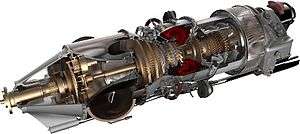General Electric GE93
| GE93 | |
|---|---|
 | |
| Type | Turboprop |
| National origin | United States |
| Manufacturer | GE Aviation |
| First run | 2017 (projected)[1] |
| Major applications | Cessna Denali |
|
| |
The General Electric GE93 is a turboprop engine under development by GE Aviation. Announced on 16 November 2015 at the National Business Aviation Association's annual tradeshow, the GE93 is the first engine in GE Aviation's Advanced Turboprop (ATP) family.[2]
Design
The 1,300 shp GE93 could be extended in an 850 to 1,600 shp range. Its 16:1 overall pressure ratio allow a 20% lower fuel burn and 10% higher cruise power than same size class competition with a 4000–6000 hour mean time between overhaul (MTBO).[3] The compressor is derived from the General Electric T700 with four axial stages and a single centrifugal stage, with the same 3D aerodynamics design used in the GE9X. The engine include variable stator vanes and 3D printed parts.[4]
The reverse-flow single-annular combustor resembles the GE-Honda HF120 design. The two-stage single-crystal high pressure turbine will be the first in this class of engines to be fully cooled. The three-stage low-pressure turbine is contra-rotating. A FADEC integrated propulsion control system will govern both engine and propeller pitch as an entire system.[5]
855 parts were replaced with 12 3D-printed parts : frames, combustor liners, sumps, exhaust case, bearing housings, stationary components in the flowpath, and heat exchangers. Overall weight is reduced by 5% and brake specific fuel consumption is improved by 1%. 3D printing isn't used for rotating components such as blades, discs and rotors.[6]
Market
The ATP is intended to cover the market between the H80 and CT7.[7] It will compete with the Pratt & Whitney Canada PT6, produced at 51,000 units and leading the small turboprop market for 50 years, adding to the sub-850 horsepower General Electric H80. It has been selected to power the new Cessna Denali single engine turboprop aircraft, seating up to 12 passengers at over 280 knots on 1,500 nautical miles. GE plans to invest up to $1 billion in the project, including $400 million for a manufacturing center in Europe.[8]
Production
The gearbox, power turbine and combustor will be made in Turin and the rotating components will be supplied from Warsaw, both locations belonging to Avio, acquired by GE in 2013, and the final assembly line should be at Walter Engines in Prague. The first engine test should happen in 2017 and it should be certified in 2020. It will feature a composite, five-bladed propeller system from McCauley, a subsidiary of Textron.[1]
Applications
Specification
General characteristics
- Type: Turboprop
- Length: same size class as the 1.83m max length PT6A
- Diameter: same size class as the 483mm diameter PT6A
- Dry weight: same size class as the 193 kg max weight PT6A
Components
- Compressor: four axial stages and a single centrifugal stage[5]
- Combustors: reverse flow single-annular combustor[5]
- Turbine: two-stage high pressure, three-stage low-pressure [5]
Performance
- Maximum power output: 1,300hp (850-1,600hp range)[3]
- Overall pressure ratio: 16:1[3]
- Specific fuel consumption: "20% lower fuel burn than same size class competition"[3]
- Power-to-weight ratio: "highest power to weight ratio in its class"[9]
- Time between overhauls (TBO): 4000-6000 hours[3]
See also
- Related development
- Comparable engines
- Related lists
References
- 1 2 "GE backtracks on Prague for turboprop assembly". Flight Global. July 13, 2016.
- ↑ "GE Aviation selects Prague, Czech Republic as location for turboprop "centre of excellence". Flight Global. January 21, 2016.
- 1 2 3 4 5 "GE Aviation launches new turboprop engine" (Press release). GE Aviation. November 16, 2015.
- ↑ Matt Benvie (November 16, 2015). ""The Biggest Win:" New Engine Set To Lift GE's Turboprop Business To New Heights". GE Reports.
- 1 2 3 4 Guy Norris (November 17, 2015). "GE Takes On PT6 Engine With Advanced Turboprop". Aviation Week.
- ↑ "GE predicts big advance in 3D printing". Flight Global. 3 November 2016.
- ↑ "GE Aviation Takes On a Titan with New Turboprop". Aviation International News. November 16, 2015.
- ↑ "GE, Textron team up to make new turboprop engine, aircraft". Reuters. November 16, 2015.
- ↑ "GE Advanced Turboprop". GE Aviation.
External links
- "Czeching In: GE Will Make Its New Advanced Turboprop Engines In Europe". GE Reports. January 20, 2016.